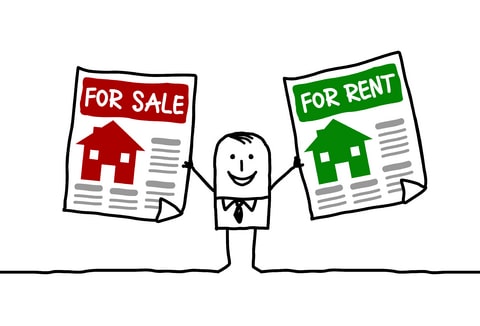Should You Rent the House or Sell It?

Here are some questions these homeowners need to ask themselves before deciding whether to rent or sell:
Do you really want to be a landlord? Keeping a rental property can be advantageous to your long-term investment plans if you are consistent in keeping a quality renter in the property. Even if your cash flow is neutral after paying all of your bills, you have the long-term potential of having someone else pay off the mortgage on your rental property. This means that, at some point, you will have a debt-free asset to sell or an income-producing asset to keep in retirement. However, if you run into a situation where you have bad renters or cannot find a consistent tenant to pay rent, you run the risk of negative cash flow, which can be a drain on your family finances.
What kind of upkeep will the house need? The property will ultimately need some level of upkeep. I’ve maintained a position that your home will need somewhere between 1% to 2% of its overall value for ongoing maintenance and upkeep. This means if your rental property is $200,000, you’ll need a side cash fund of $2,000 to $4,000 annually. Most people who own rental properties don’t plan for emergencies, such as a broken water heater, that may come up.
Is there equity in the house? Real estate in general is a long-term asset. You generally shouldn’t buy real estate unless you have five years or more to hold the property–and in today’s market it may be more like 10 years.
There are people who know how to property flip, but the odds are it isn’t you. If your spouse’s property is under water, it may make sense to hold on to the house for several years to see if you can get a rebound in the home’s value. This is preferable to a short sale, which can damage your credit as a newly married couple. If the property has equity, consider the overall trajectory of growth of the value of house compared to you having the cash in your hand to invest in other areas.
Can you refinance? Typically, interest rates are a little bit higher on rental properties than on a primary residence. With rates still around all-time lows, you should check into a refinance to see if you can lower your overall costs before you explore the idea of renting.
Can you actually rent the house? Some homeowners or condo associations only allow for a certain number of homes or condominium units to be rented out within a development or building.
Will you get any additional tax breaks? Check with a certified public accountant on this one. Depending on your overall adjusted gross income and how the property is structured, you may or may not be eligible for a tax break. Most people will use straight-line depreciation on the property over the life of the property, so you may run into a situation where you are cash-flow neutral and actually have a tax loss on paper. This is a critical piece of the equation when you start looking at the math.
Ted Jenkin (@tedjenkin) is the co-CEO and founder of oXYGen Financial, a financial advisory firm focused on the X & Y generations. He also blogs at yoursmartmoneymoves.com.
Source: Wall Street Journal















 Accessibility
Accessibility